Hamas Cannot Be Fought Like al-Qaeda
Grouping the two terrorist organizations together obscures some important distinctions.

Published by The Lawfare Institute
in Cooperation With

Editor’s Note: Hamas’s Oct. 7 terrorist attack is rightly denounced, but often missing from the discussion is how Hamas differs from other terrorist groups. National Defense University’s Kim Cragin contrasts Hamas with al-Qaeda and the Islamic State, assessing in particular its political role and how this involvement makes traditional counterterrorism tools less effective.
Daniel Byman
***
Israel’s prime minister has compared the Oct. 7, 2023, attack to al-Qaeda’s strikes against the World Trade Center in New York City and the Pentagon on Sept. 11, 2001. Israel Defense Forces spokesmen also have likened Hamas’s attack to beheadings by the Islamic State in 2014-2015, as well as to the Islamic State’s attacks against Yezidi women. These comparisons emphasize the scope and brutality of Hamas’s tactics, but they also obscure significant differences between the terrorist groups. These differences are instrumental to deliberations about the most appropriate and effective counterterrorism response. Hamas is not al-Qaeda, and previous and familiar tactics, such as targeted strikes, clearing operations, and limited security cooperation with the Palestinian Authority, will not destroy it.
Unlike al-Qaeda or the Islamic State, Hamas adheres to a nationalist worldview. Hamas has its roots in the religious Muslim Brotherhood. It uses religious rhetoric and portrays itself as an Islamist organization, but its ambition is to lead an internationally recognized modern state. Some of its earlier documents echo universal ideals, but these are outliers. Hamas’s leaders have no political interest beyond what the group views as the borders of Palestine. Its nationalism can be seen most clearly in its members’ behavior. When Israel deported approximately 400 Hamas members in December 1992, for example, they did not disperse as was common at the time for other militants, including those from groups from Egypt, Algeria, and Yemen. More often than not, deported terrorists have tended to disperse to places like Afghanistan or Sudan and pursue global objectives. But Hamas’s members opted to remain in Lebanon and worked to return to the West Bank and Gaza Strip. Several of Hamas’s current leaders were among them: Ismail Haniyeh, Mahmoud Zahar, and Marwan Issa, who was killed in Gaza in an airstrike in March).
Hamas leaders are so nationalistic that they take offense when other militant groups borrow the Palestinian cause for their globalist agendas. Hostility erupted between Hamas and al-Qaeda along these lines in 2007 and 2008. Al-Qaeda’s deputy at the time, Ayman al-Zawahiri, presumed to lecture Hamas in a series of online posts and dialogues about what constituted a credible resistance movement and what was best for the Palestinian people. Hamas leaders responded to Zawahiri with derision, stating,
If somebody has forgotten the Palestinian issue and al-Quds [Jerusalem], the place of Allah’s Messenger’s nocturnal journey, the resistance movement, Hamas, is still offering martyrs and blood for them. But it appears that there is someone who forgot what Hamas has offered and what it can still offer. ... We know better what is around us from conditions and circumstances, and we deal with it according to what serves the interests of our Palestinian people.
Also, while al-Qaeda and the Islamic State reject secular political systems, Hamas participates in student council, labor union, municipal, and national elections. Many articles about Hamas make note of its electoral success in the Palestinian Legislative Council elections that took place in 2006. Hamas won 74 of 132 seats in the proportional and geographic lists, with an additional three candidates strongly aligned to Hamas’s Change and Reform party. But these were not Hamas’s first attempts at self-rule. In August 1992, the Hamas-led Islamic Bloc won 43 percent of the vote for the Engineers Association in the West Bank. Two years later, in August 1994, the Israeli-appointed mayor of Jericho City stepped down and was replaced by a new city council with two Hamas representatives. Hamas also ran candidates in the December 2004 and January 2005 municipal elections, winning a majority of seats in 23 of 84 municipal councils. Hamas’s participation in these elections, as well as its willingness to partner with opponents to achieve Palestinian self-rule, represents an important contrast to al-Qaeda or the Islamic State.
Interestingly, Hamas leaders opted not to nominate candidates in the 1996 Palestinian presidential and legislative elections. That’s not to say that it wasn’t considered. This deliberation was recorded in an internal memo written and distributed by Hamas leaders in July 1992. It queried Hamas supporters on how it should respond to the Oslo Accords, which Hamas and others anticipated would lead to national elections. Hamas officials expressed concern that, under these circumstances, the organization’s participation in national elections would legitimize concessions made to Israel by Fatah.
Between 1992 and 1995, Hamas leaders rejected several, albeit limited, offers by Yasser Arafat to join the newly formed Palestinian Authority. Their primary opposition, as articulated in the Hamas newspaper al-Watan, was that the Palestinian Authority had failed consistently in its efforts to make progress in negotiations with Israel. Then, in the run-up to the 1996 Palestinian presidential and legislative elections, five Hamas members announced that they would run for office. Four of those candidates, though, eventually withdrew after pressure from Hamas; Ismail Haniyeh, who was elected Hamas’s political leader in May 2017, was one of them.
Hamas leaders, in boycotting the 1996 elections, argued that negotiations with Israel would never yield a Palestinian state. They were in the minority. A survey taken by the Jerusalem Media and Communications Center (a Palestinian organization) in October 1995 found that only 16.4 percent of Palestinians opposed the negotiations. This support for the Oslo process has changed dramatically over the past two decades. In a poll conducted in early September 2023, just a few weeks before the Oct. 7 attack, 68 percent of Palestinian residents in both the West Bank and the Gaza Strip said they believe the Oslo Accords hurt Palestinian national interests, and only 11 percent support them, according to the Palestinian Center for Policy and Survey Research.
Hamas has won the internal Palestinian debate over the utility of negotiating with Israel. They have persuaded Palestinians that political negotiations will not yield a state. This represents the most significant difference between Hamas and al-Qaeda or the Islamic State. Neither al-Qaeda nor the Islamic State won over a majority of their audiences to a core part of their worldview. Yet Hamas has done so.
It also means that more traditional counterterrorism measures—killing terrorist leaders, pushing them out of their safe havens, rebuilding those havens—are unlikely to work. In many ways, Hamas has become synonymous with cynicism about the effectiveness of peaceful collective action, diplomatic negotiations, and international pressure as mechanisms to achieve self-rule. As long as this worldview remains dominant among Palestinians, traditional counterterrorism measures might fracture Hamas’s existing structure, but they are unlikely to truly defeat the organization. It will retain too much support.
That Hamas differs from other terrorist organizations in no way justifies Hamas’s violence on Oct. 7 or prior. But policymakers should be skeptical that rehashing old policies that have emphasized killing Hamas members, limited cooperation with the Palestinian Authority, and slow confidence-building measures will yield results. This approach has not proved effective at undermining Hamas in the past, and it won’t defeat Hamas in the present. Hamas will be defeated only once its narrative is viewed as misguided, if its approach is viewed as ineffective, and if its agenda is viewed as contrary to Palestinians’ best interests.





